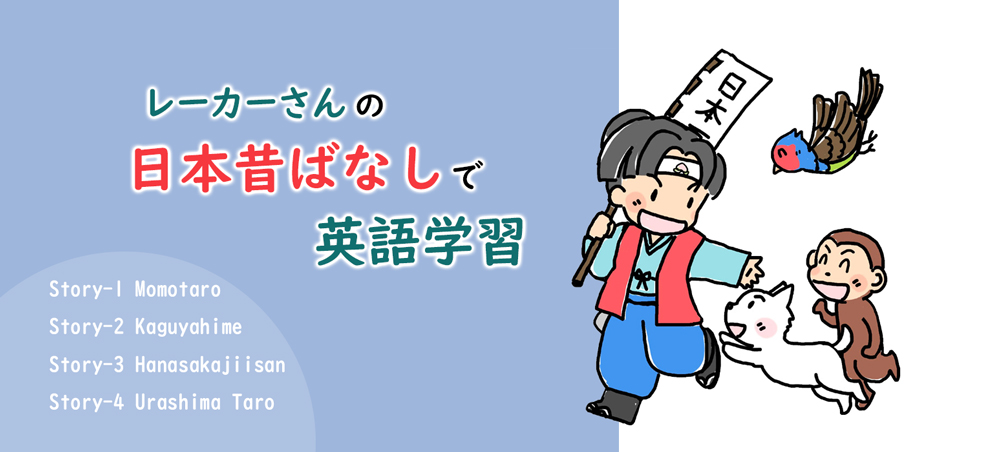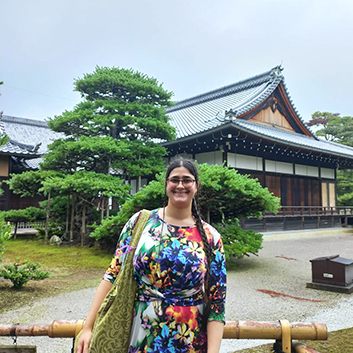
Grammar Rewrites
The Grammar Rewrites are a series of Japanese folk tales, retold in (simple) English with a focus on different grammar aspects. This means that for each grouping of sentences, I chose a specific structure(e.g. to be good at something), which I did my best to use for every sentence to tell the story.
Sometimes this leads to slightly weird sentences, but the purpose of the exercise is to practice the grammar forms in a context that will aid in understanding the sentence and possibly broaden the students’ vocabulary.
[ 説明 ]
”The Grammar Rewrites”は、ワーキングホリデーで日本にやってきたドイツ人のレーカーさんが「まんが日本昔ばなし」を題材にして作った英文法の学習方法です。
学年に適した文法事項を活用して学習できるようにしています。
特定の文法を利用してどのように英文を作ったらよいか、また文で用いられている文法事項はどのような意味を持つのかなどを学習できます。

Hi, I’m Reekha. I’m from Germany and have studied various languages in university. Among them are Japanese and Hindi, as well as Korean and Indonesian.
In my free time I enjoy reading and writing, as well as finding opportunities to practice my language skills.
Recently I have decided to become a full time teacher and I’ve based this decision on a language tutorial I taught in university as well as my experience teaching at Lingua House so far. Teaching is a creative process and the individuality of each student makes it especially fun. There’s no one way to learn a language and finding different ways to match the student is a challenging task but part of the fun.
I hope you can enjoy learning here and that your new language skills open many doors for you. Good luck!
こんにちは、私はレーカーです。ドイツ出身で、大学では様々な言語を学んできました。日本語やヒンディー語、さらには朝鮮語やインドネシア語も学びました。
時間がある時には、読むこと・書くことを通して、自身の言語能力に磨きをかける機会を設けています。
最近になり、本格的に教諭になろうと決めました。この決断は、これまでの大学での指導経験やリンガハウスでの経験に基づいています。教えるということは創造的な過程で、生徒さん一人一人の個性によって、さらにそれは面白くなります。言語を学ぶのに唯一絶対の方法はありません。生徒さんに合うやり方を見つけることは、大変だけれども、楽しいことです。
これを読んでくださっている皆さんが、ここでの学習を楽しみ、身につけた言語能力によって、たくさん新たな扉を開くことを願っています。Good luck!

Hi, I’m Reekha. I’m from Germany and have studied various languages in university. Among them are Japanese and Hindi, as well as Korean and Indonesian.
In my free time I enjoy reading and writing, as well as finding opportunities to practice my language skills.
Recently I have decided to become a full time teacher and I’ve based this decision on a language tutorial I taught in university as well as my experience teaching at Lingua House so far. Teaching is a creative process and the individuality of each student makes it especially fun. There’s no one way to learn a language and finding different ways to match the student is a challenging task but part of the fun.
I hope you can enjoy learning here and that your new language skills open many doors for you. Good luck!
こんにちは、私はレーカーです。ドイツ出身で、大学では様々な言語を学んできました。日本語やヒンディー語、さらには朝鮮語やインドネシア語も学びました。
時間がある時には、読むこと・書くことを通して、自身の言語能力に磨きをかける機会を設けています。
最近になり、本格的に教諭になろうと決めました。この決断は、これまでの大学での指導経験やリンガハウスでの経験に基づいています。教えるということは創造的な過程で、生徒さん一人一人の個性によって、さらにそれは面白くなります。言語を学ぶのに唯一絶対の方法はありません。生徒さんに合うやり方を見つけることは、大変だけれども、楽しいことです。
これを読んでくださっている皆さんが、ここでの学習を楽しみ、身につけた言語能力によって、たくさん新たな扉を開くことを願っています。Good luck!
桃太郎
Momotaro
Grammar[ 使用する文法 ]
- can/to be good at
- want to
- possessive pronouns
- have
can / to be good at
- An old woman can do laundry and is good at cooking.
- Her husband is good at cutting grass.
- A big peach can float on the river.
- She can carry the peach home.
- The old farmer is good at cutting peaches.
- But a child comes out of the peach.
- The couple is good at naming and name the child Momotaro.
- Momotaro can grow up well and is good at helping people.
laundry – 洗濯,
(to) cut – 刈る,
naming –名付ける
want to
- Momotaro wants to fight the demons.
- The dog wants to eat Momotaro’s sweet dumplings.
- Momotaro wants the dog to help him.
- A monkey wants to walk with Momotaro.
- The dog doesn’t want the monkey to come along.
- But the monkey also wants to fight the demons.
- Later, Momotaro wants the bird to be peaceful.
- The bird wants to help Momotaro.
demon – 鬼,
sweet dumplings – 黍団子,
peaceful – 平和的
wants to and possessive pronouns
- The demons steal the villagers’ treasure.
- Momotaro wants to take back the treasure.
- The dog wants to eat Momotaro’s sweet dumplings.
- Momotaro says, “These are my dumplings. They are not yours.”
- The dog wants to help Momotaro and he gives the dog his dumpling.
- The dog doesn’t want the monkey to fight with them.
- Momotaro wants to give the monkey his dumpling.
- The bird also wants to share their dumplings.
steal – 盗む,
take back – 取り戻す,
treasure – 財宝
Have
- The demons have a castle on an island.
- Momotaro, the dog, monkey and bird have a boat.
- The dog has strong fangs and bites the demons.
- The monkey has sharp claws and scratches the demons.
- The bird has a strong beak and picks at the demons.
- “Now I have the treasure”, says Momotaro.
- Now the demons do not have a castle.
- Momotaro’s parents have their son back.
castle – 城,
fang – 牙,
claw –(動物の)爪,
beak – くちばし
☆来週は、かぐや姫のお話しを用いて過去形や命令形を学びます。